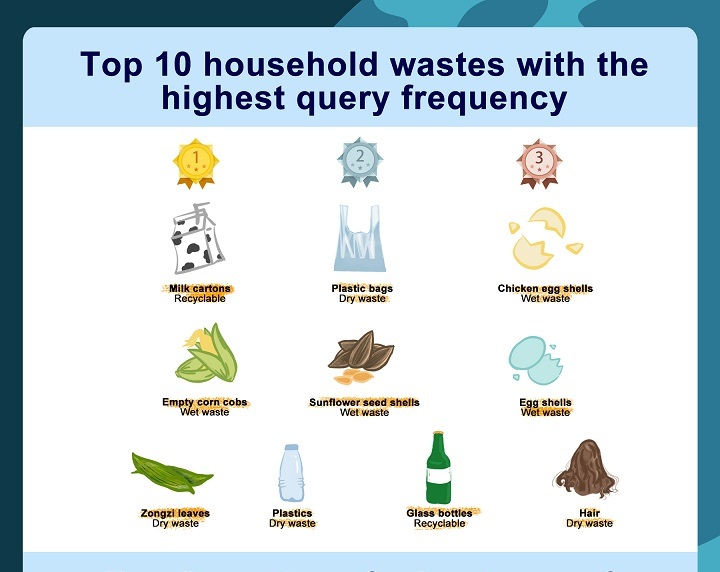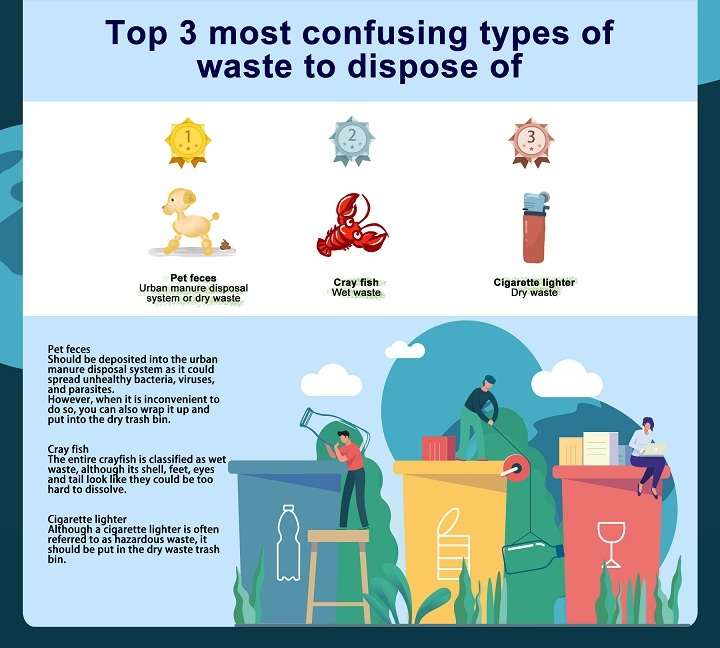What are the top 10 most confusing household waste products for Shanghai locals to recycle?
Source:Global Times Published: 2020/7/1 19:00:28

Graphics: Chen Xia/GT
Is a crayfish's hard shell or claws wet waste or dry waste? Should I put used zongzi leaves into the wet trash bin as it's from a plant that doesn't look harmful? Shanghai, the first city in China to implement mandatory garbage sorting, listed the city's residents' top 10 most queried household waste products as of June.
For example, milk cartons, which should be recycled, had been searched more than 324,000 times on the city's garbage classification query platform, ranking first on the list; plastic bags, which are different from plastic bottles, because they can't be recycled, are classified as dry waste, coming second on the list with more than 281,000 queries.
The next four most queried waste products were chicken egg shells, empty corn cobs, sunflower seed shells and egg shells,.
One commonly queried waste product, zongzi leaves, the remnants of one of Shanghai's most favorite snacks, belong in the dry waste trash bin, even though it actually comes from a plant. In fact, its long fiber-like structure, which is often compared to hair, does not decompose very easily, and will likely disrupt the key parts of the machine in the wet garbage pretreatment process.
The platform also listed the three most confusing types of garbage waste to dispose: pet feces, crayfish, and cigarette lighters.
Pet feces should be deposited into the urban manure disposal system as it could spread unhealthy bacteria, viruses and parasites; however, when it is inconvenient to do so, you can also wrap it up and put into the dry trash bin.
The entire crayfish is classified as wet waste, even with its shell, feet, eyes and tail that could look like they might be too hard to dissolve. Cigarette lighters should be put in the dry waste trash bin, although it is often referred to as a hazardous product at metro stations and airports.

Graphics: Chen Xia/GT
The garbage sorting query platform answered more than 29.46 million queries over the past year. What's more, the number of total entries available exceeds 100,000. In total, 95 percent of Shanghai's local residents have joined the garbage sorting query platform.
Shanghai began implementing mandatory domestic waste sorting on July 1, 2019, with the one-year practice has produced remarkable fruits.
Statistics show that, as of mid-June, Shanghai retrieves 6,813.69 tons of recyclables every day, an increase of 71.09 percent year on year, while the city's daily sorted hazardous waste has grown 11.2-fold year-on-year to 3.3 tons, according to Shanghai's authorities.
For Shanghai, its classified garbage is a valuable resource; that is, 70 percent of all garbage from the city's downtown area is transported to a large waste disposal and energy reutilization base located in southeastern Shanghai, where it is transformed into a more earth-friendly energy source.
Currently, more than 230 Chinese cities including Beijing, Hangzhou, Xiamen and Shenzhen have implemented their own garbage sorting policies, according to media reports. Among the 46 major Chinese cities piloting mandatory sorting, 30 have issued garbage sorting regulations or rules, and 16 cities, including Shenzhen and Taiyuan, have included garbage sorting into their credit systems, reports said.
Posted in: SOCIETY